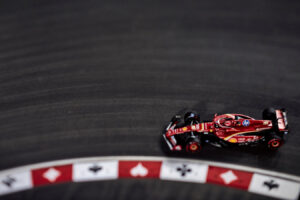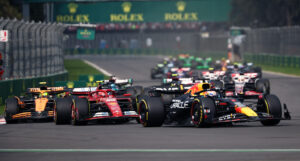“If you’re not first, you’re last.” – Ricky and Reese Bobby
That was the catchphrase of the 2006 film Talladega Nights: The Ballad of Ricky Bobby. The titular character based his life and his NASCAR career on that quote.
Bobby heard the quote first from his father, Reese Bobby, who surprised him at his school’s career day. Reese, a semi-professional race car driver (plus volunteer fireman and amateur tattoo artist) smoked in the classroom, disclosed his drug use and called the teacher a loser. Which got him kicked out of the school. Before leaving campus, Reese told Ricky “If you’re not first, you’re last.”
As a driver, Bobby would do anything to win, even if it meant crashing both his car and the car driven by his best friend and teammate Cal Naughton Jr. In a race at “Texas Motor Speedway,” though clearly shot at Charlotte Motor Speedway, that Bobby won early in the movie, he drove in reverse after he dumped Naughton and spun out to beat Jamie McMurray in a photo finish.
Darlington Nights: NASCAR’s Ricky Bobby Problem
Winning’s all that matters in NASCAR, right?
That’s what racing is supposed to be right? Drivers so obsessed with winning that nothing else matters. Top-10 points, the condition of the race car, the reputation among fellow drivers, that’s all irrelevant during a race, right?
Since the movie’s release, NASCAR embraced the “If you’re not first, you’re last” notion. From “boys have at it,” to the playoff system, to the maligned low horsepower/high downforce package currently run at NASCAR’s biggest tracks, the sanctioning body sought ways to encourage physical racing, punish dominance and consistency, and keep the field packed together.
Broadcasters followed suit. Most of the attention is on the leader, regardless of how big of a lead they have.
Who cares about a close, multi-lap battle for eighth, or a driver flying through the field, catching up to the leader? Who cares when mid-tier teams like JTG Daugherty Racing, Roush Fenway Racing, Trackhouse Racing and Spire Motorsports punch above their weight? They’re not leading or running in the top-three.
After all, “if you’re not first, you’re last.” If you’re not competing for victories at all times, you’re a loser. You’re a loser if you lose control of your loose, low downforce race car, if you go six weeks without a victory after winning nine of the first 30 races and building an average finish two spots better than the next best driver. You’re a loser if you’re a small, underfunded team.
You’re either a winner or a loser.
It really isn’t, though.
U guys r so stupid w your wanna b tag lines. 🤦🏻♂️ Every week u praise the winner and shame those following. 😡 https://t.co/1RB1kGYcpP
— Kyle Busch (@KyleBusch) May 10, 2021
There’s just one problem with that…
“Hell Ricky, I was high when I said that. That doesn’t make any sense at all. You can be first, you can be second, you can be third, fourth. Hell. you can even be fifth.” – Reese Bobby.
After he got the Bobby family kicked out of an Applebee’s, Reese revealed to Ricky that the quote he based his whole life on was nonsense.
Turns out, you’re not a loser if you don’t win a race after all. There’s actually a lot to race for if you don’t have a car capable of winning. Second pays a lot of money and awards a ton of points. A driver doesn’t have to compete for a victory to have a good race and a race doesn’t need a constant battle for the lead to be exciting. There are 36-plus cars on track. All of which compete for something of value.
It’s time NASCAR and its broadcast partners realize that.
TOP IMAGE: Sean Gardner/Getty Images






